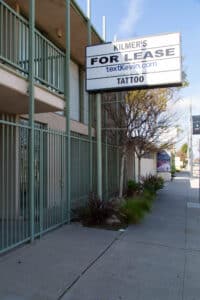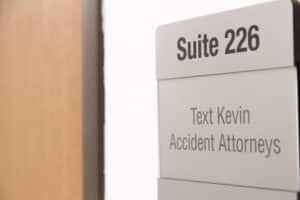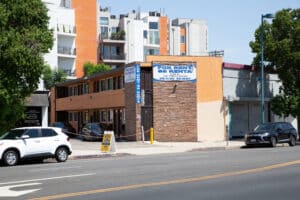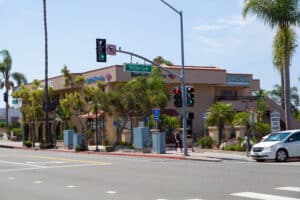According to California Vehicle Code 20001 VC: Felony hit and run causing injury, if a motorist is responsible for causing a car accident where the other involved party has been seriously injured or killed, they can face felony hit and run charges.
When you are suddenly struck by another vehicle, you assume that they will stop and exchange insurance information at the very least. However, if the driver that hit you flees the scene, leaving you to deal with critical injuries and the fallout of the collision on your own, they should be brought to justice. The California Highway Patrol (CHP), local law enforcement officials, and your dedicated car accident lawyer from Text Kevin Accident Attorneys can begin investigating as soon as possible after the wreck, allowing us to identify the fleeing driver sooner.
Investigators and law enforcement officials will be responsible for handling the criminal charges under Vehicle Code 20001(a) VC: Felony hit and run causing injury. Your legal advocate with our firm will handle your insurance claim and personal injury lawsuit where you will demand full compensation for your damages and suffering. The state’s criminal case against the fleeing driver may help us build the strongest case possible in civil court. Find out more about how hit and run accident claims unfold, how a criminal case will affect your lawsuit, and what you could be awarded if your case is successful when you contact our law office to request a free consultation today.
What Is Vehicle Code 20001(a) VC: Felony Hit and Run Causing Injury?
Understanding the language of CVC 20001(a) is essential after a hit and run accident. The statute reads as follows:
20001.
(1) (a) The driver of a vehicle involved in an accident resulting in injury to a person, other than himself or herself, or in the death of a person shall immediately stop the vehicle at the scene of the accident and shall fulfill the requirements of Sections 20003 and 20004.
(b) (1) Except as provided in paragraph (2), a person who violates subdivision (a) shall be punished by imprisonment in the state prison, or in a county jail for not more than one year, or by a fine of not less than one thousand dollars ($1,000) nor more than ten thousand dollars ($10,000), or by both that imprisonment and fine.
(2) If the accident described in subdivision (a) results in death or permanent, serious injury, a person who violates subdivision (a) shall be punished by imprisonment in the state prison for two, three, or four years, or in a county jail for not less than 90 days nor more than one year, or by a fine of not less than one thousand dollars ($1,000) nor more than ten thousand dollars ($10,000), or by both that imprisonment and fine. However, the court, in the interests of justice and for reasons stated in the record, may reduce or eliminate the minimum imprisonment required by this paragraph.
(3) In imposing the minimum fine required by this subdivision, the court shall take into consideration the defendant’s ability to pay the fine and, in the interests of justice and for reasons stated in the record, may reduce the amount of that minimum fine to less than the amount otherwise required by this subdivision.
(c) A person who flees the scene of the crime after committing a violation of Section 191.5 of, or paragraph (1) of subdivision (c) of Section 192 of the Penal Code, upon conviction of any of those sections, in addition and consecutive to the punishment prescribed, shall be punished by an additional term of imprisonment of five years in the state prison. This additional term shall not be imposed unless the allegation is charged in the accusatory pleading and admitted by the defendant or found to be true by the trier of fact. The court shall not strike a finding that brings a person within the provisions of this subdivision or an allegation made pursuant to this subdivision.
(d) As used in this section, “permanent, serious injury” means the loss or permanent impairment of function of a bodily member or organ.
When Drivers Can Be Charged With Felony Hit and Run Under CVC 20001
California Vehicle Code 20001 makes it possible for hit and runs to be charged as felonies. When a collision involves property damage, severe bodily injury, or death, motorists are legally required to report the accident to the police according to the CA Department of Motor Vehicles. No matter who is responsible for causing the accident, if a driver flees the scene, they can be charged criminally.
The burden of proof in criminal cases is beyond a reasonable doubt according to California Code, Penal Code – PEN § 1096. For the district attorney to secure a guilty verdict, they must prove that the elements of the offense have been met. For CVC 20001, these elements include:
- The driver was involved in a car accident
- The accident resulted in someone else’s serious injury or death
- The driver should have known or knew that someone else was seriously injured or killed in the accident
- The other driver failed to help the injury victim, stop at the accident scene, or provide their name, address, insurance information, and other pertinent details to the injury victim or responding officers
Motorists can be convicted under 20001 VC when they flee the scene willfully. This does not mean that they must have intended to cause injury or death, commit a crime, or gain an advantage in any way.
Note
If the accident resulted in property damages, but no one was critically injured or killed, charges under 20001 VC may not apply. Instead, the prosecuting attorney may opt to pursue charges under Vehicle Code 20002 VC. These are misdemeanor hit and run charges, punishable by up to six months in jail and fines of up to $1,000. Whether the driver that hit you is charged under 20001 VC or 20002 VC, you maintain your right to take legal action against the at-fault party in civil court.
Real-Life Examples of Felony Hit and Runs
Felony hit and run accidents are far more common than you might think. One of the most common instances where charges may apply under 20001 VC includes driving under the influence (DUI) accidents. If the driver that hit you was operating their vehicle under the influence of drugs or alcohol when they hit you in a parking lot, felony hit and run charges may apply.
If you are involved in a collision with another driver, and one of your vehicle passengers suffers fatal injuries due to the fleeing driver’s negligence, not only could felony hit and run charges apply, but the defendant could also face related criminal charges and liability in your wrongful death lawsuit.
It is important to remember that felony hit and run charges do not only apply to fatal injuries. Anytime someone suffers any type of injury, whether that injury is considered minor or critical, charges under CVC 20001 may be appropriate.
Stacked Charges May Apply
Criminal charge stacking involves the defendant being charged with multiple criminal offenses related to a single event. If the driver that hit you is charged with felony hit and run under 20001 VC, they could also face charges under:
- PC 192(c) for vehicular manslaughter
- California Vehicle Code 23152 for driving under the influence
PC 192c – Vehicular Manslaughter
If someone you love was killed in the collision, the prosecutor may charge the defendant with vehicular manslaughter under California Penal Code 192(c). Vehicular manslaughter charges apply when:
- The fleeing driver is responsible for causing the motor vehicle accident
- The fleeing driver’s negligence caused the death of another
The consequences of a conviction under Penal Code 192(c) will vary depending on whether the defendant’s conduct is considered ordinary negligence or gross negligence. If the defendant’s conduct is considered ordinary negligence, the statute allows misdemeanor criminal charges. If convicted, the at-fault party could spend up to one year in county jail. However, if the defendant’s actions are considered grossly negligent, vehicular manslaughter charges can be tried at the felony level. If convicted, they could spend up to six years in a California state prison.
CVC 23152 – Driving Under the Influence (DUI)
One of the most common reasons motorists flee the scene after a car accident is because they are under the influence of drugs or alcohol and know they could face criminal charges. Under California vehicle code 23152 VC, the driver that hit you could be charged with a DUI if they were under the influence or impaired, meaning they were no longer capable of driving as safely as someone who was sober. This means DUI charges could apply even if the fleeing driver’s blood alcohol concentration (BAC) levels were under the legal limit of .08%.
In most DUI cases, misdemeanor charges will apply. However, DUI can be charged at the felony level if the offender has four or more DUI convictions on their record. If convicted, motorists could:
- Be required to attend DUI school
- Be placed on probation
- Have their driver’s license suspended or revoked
- Be ordered to pay fines or restitution to injury victims
Tip
The Driver That Caused Your Hit and Run Should Be Brought to Justice
If the fleeing driver is charged criminally under CVC 20001, they can face charges at the felony or misdemeanor level depending on the circumstances of the case. If the case is tried as a misdemeanor, the defendant could be ordered to pay fines of up to $10,000 and spend up to one year in jail with a minimum 90-day term of incarceration. However, if the state pursues charges at the felony level, the defendant could pay fines not to exceed $10,000 and spend as much as four years in a California state prison.
But that is not all.
You have the right to take legal action against them in civil court. If the defendant has auto insurance coverage, we may begin by filing a claim against their auto insurance policy since California is a fault state per the California Insurance Code – INS § 11580.1. Liable parties are held accountable for the victim’s damages, which means the insurance company will be required to compensate you for specific types of damages.
Do not expect your insurance settlement to be enough to meet your needs. The insurance company will only pay for covered losses such as medical bills and vehicle repair expenses. If the loss is not covered by the insurance policy, the insurance company will not compensate you for it. For this reason, we may need to move forward with a car accident lawsuit in civil court. Thankfully, at trial, you can demand full compensation for your losses. Some examples of potentially recoverable damages could include:
- The diminished value of your vehicle
- Disfigurement and permanent disability
- Reduced earning potential and loss of income
- Ambulance bill, co-pays, prescription medications, and diagnostic testing fees
- Medical devices, equipment, and home accommodations
- Future healthcare costs related to your injuries
- Pain and physical suffering
- Mental anguish and emotional distress
- Rental car expenses and the cost of vehicle repairs or replacement
CVC 20001 FAQ
What happens if the fleeing driver blames me for the accident?
Do not be surprised if the driver that flees the scene blames you for causing the collision. Criminal charges under 20001 VC apply even if the fleeing driver is not responsible for causing the accident. However, it is common for at-fault parties to blame the victim. It helps that California is a pure comparative negligence state per California Civil Code 1714.
Sharing blame does not prohibit you from being awarded compensation from an insurance settlement or personal injury claim. The law requires parties that share blame be held accountable for their percentage of culpability. To ensure justice is served, the court system deducts your portion of fault from your payout.
For example, if you were not wearing your seatbelt when the fleeing driver rear-ended you, the judge might agree that you are 15% responsible for your whiplash injuries. If this were to happen, your car accident settlement would be reduced by 15%, leaving you with 85% of the award. Since comparative negligence laws can have such a dramatic impact on the outcome of your case, it is necessary to consult a skilled catastrophic injury lawyer from Text Kevin Accident Attorneys who can challenge the defendant's partial blame allegations.
Can VC 20001a be reduced to a misdemeanor?
Pro Tip
Whether the driver that hit you faces criminal charges under CVC 20001 will have no bearing on the outcome of your personal injury lawsuit against them. While we can certainly utilize the state's guilty verdict in our favor to establish liability for your injuries and damages in court and with the insurance company, if the prosecutor opts to dismiss the defendant's criminal charges or allow them to plead to a lesser offense, it will not reflect poorly on your car accident lawsuit or our negotiations with the insurance company.Can I be awarded punitive damages if the driver that hit me violated CVC 20001?
You may absolutely be awarded punitive damages if the driver that caused your collision was in violation of 20001 VC. Fleeing the scene of a car accident may be considered grossly negligent or even intentional depending on the specific details of your case. The statute for punitive damages under California Civil Code Section 3294 states that this type of award can only be issued if the defendant's conduct is malicious or egregious.
Although punitive damages are not awarded in every car accident case, if a driver flees this scene, it shows a blatant disregard for the victims who were injured or killed in the collision. You could expect punitive damages to be issued if the California civil court hearing your case believes the defendant should be punished beyond your compensatory losses.
Get in Touch With Our Strategic Car Accident Lawyers For a Free Consultation Today
Violation under California Vehicle Code 20001(a) is generally considered a felony offense, punishable by jail time, fines, and other criminal penalties. But that is not all. With the legal guidance of an experienced California car accident lawyer from Text Kevin Accident Attorneys, you can ensure the driver who hit you is held accountable to the fullest extent of the law. You may have the right to take legal action against them in civil court and demand payment from their insurance provider.
While you recuperate from your injuries, we can negotiate with the insurance company on your behalf and prepare to present a powerful case for compensation at trial. Do not get stuck absorbing the costs of someone else’s recklessness. Make the liable party pay. Complete our online contact form or call our office to schedule your free, no-obligation consultation as soon as today.




































































































































































